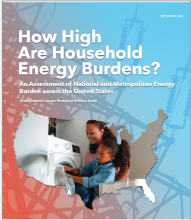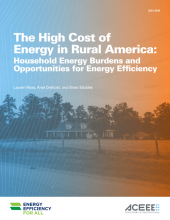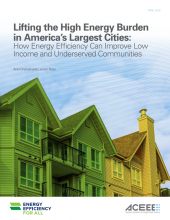Low-Income, Black, Hispanic, and Native American Households Face High Energy Burdens
Even before the COVID-19 recession, energy bills strained many family budgets—and some far more than others. ACEEE’s 2020 research found that low-income, Black, Hispanic, and Native American households all face dramatically higher energy burdens—spending a greater portion of their income on energy bills—than the average household. High energy burdens are correlated with greater risk for respiratory diseases, increased stress and economic hardship, and difficulty in moving out of poverty. These communities also experience acute systemic inequalities, barriers, and limited access to public and private resources, and they are now being hit the hardest by job losses and health impacts of the pandemic.
We found the same patterns of inequality play out nationally, regionally, and across all metro areas in our study. These energy burden disparities must be addressed. Inefficient housing is a key factor leading to high energy burdens. Policymakers and utilities can boost funding for energy efficiency retrofits and weatherization for the communities who experience the highest energy burdens.
How High Are Household Energy Burdens?
An Assessment of National and Metropolitan
Energy Burdens across the United States
View ACEEE's testimony before the Subcommittee on Energy of the U.S. House Committee on Energy and Commerce on the topic of “Generating Equity: Improving Clean Energy Access and Affordability.”
Metropolitan Area and National Fact Sheets
The report is accompanied by fact sheets highlighting energy burdens in 25 individual metro areas, as well as a fact sheet on national regional energy burdens:
Atlanta | Baltimore | Birmingham | Boston | Chicago | Dallas | Detroit | Houston | Las Vegas | Los Angeles | Miami | Minneapolis | New York City | Oklahoma City | Philadelphia | Phoenix | Richmond | Riverside | Rochester | San Antonio | San Francisco | San Jose | Seattle | Tampa | Washington, DC
National and Regional Energy Burdens
Contact Us
For additional questions on energy burden data or policy solutions, please contact Amanda Dewey.
For media inquiries, please contact Ben Somberg.




